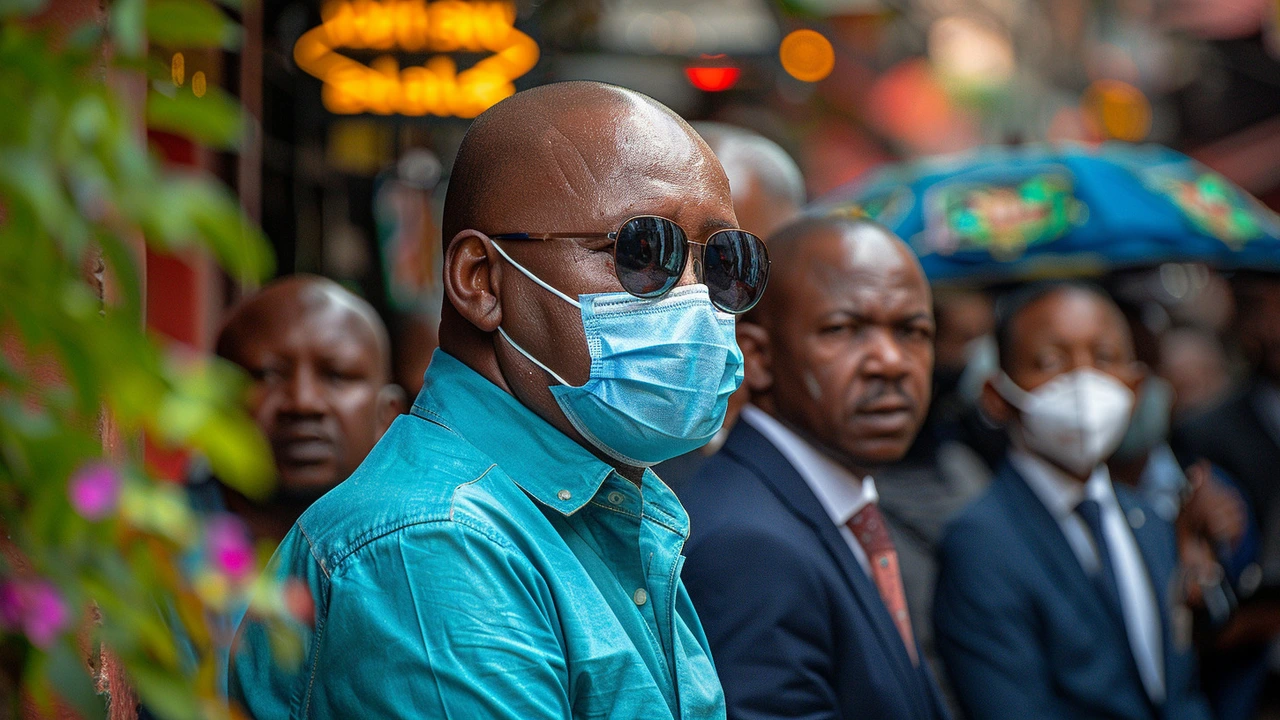Kapseret MP Oscar Sudi Dismisses Cleophas Malala's Warning
In a dramatic turn of events, Kapseret Member of Parliament Oscar Sudi has publicly refuted the warning issued by United Democratic Alliance (UDA) Secretary General Cleophas Malala. The tension-filled exchange has brought to light the underlying conflicts within Kenya’s ruling party.
Malala's stern warning targeted not only Sudi but also other prominent politicians, including Nyeri Governor Mutahi Kahiga and Githunguri's Gathoni Wa Muchomba. He demanded that they immediately halt their verbal attacks on the party's leadership, specifically mentioning the presidency, under the threat of disciplinary measures. In a broader missive, Malala also cautioned Cabinet Secretaries Kipchumba Murkomen and Moses Kuria to curtail their political activities to adhere to legal stipulations. Young politicians were also advised to back away from premature 2032 campaign activities, signifying a pervasive call for order within the party ranks.
Malala's Sharp Rebuke and Party Discipline
Malala’s robust approach can be seen as an attempt to restore order and unity within the UDA amidst multiplying public confrontations. His intentions, however, did not sit well with Sudi, who didn't hesitate to label Malala as an 'elevated MCA,' a term underscoring his perceived lack of significant political clout. Sudi's response was not just dismissive but also intensely critical.
The Kapseret MP didn’t hold back any punches, accusing Malala of suffering from 'illusory superiority' and drawing unflattering comparisons with Raphael Tuju, the former Secretary General of Jubilee Party. Sudi's assertion implied that Malala's current stance and admonitions were misguided and baseless. This assertion feeds into a broader narrative of internal conflict within the UDA as the party tries to consolidate its position and manage divergent political interests within its fold.
Deputy President Gachagua’s Influence
This isn't the first time Sudi has found himself at odds with top-tier political figures. Prior to this incident, Sudi criticized Deputy President Rigathi Gachagua’s directive that Rift Valley MPs stay clear of Central Kenya's political landscape. Gachagua's admonition was sparked by what he perceived as undue interference by Sudi and his contemporaries, leading to more fragmented relationships within the UDA.
Gachagua’s warning was interpreted as an attempt to preserve regional political sanctity and prevent cross-regional power struggles. Yet, it appears that Sudi sees such mandates as overstepping and detrimental to broader party cohesion. His outspoken nature highlights a continuous battle between political allegiance and regional loyalty within the heart of UDA.
Underlying Rift Within UDA
The exchange between Sudi and Malala brings attention to a deeper _largely_ political rift within UDA, marked by factional disputes and power jockeying. Sudi's resistance further emphasizes a hesitancy to fully align with top directives without question. This cascading effect of defiance can be seen as igniting broader debates around political freedom, party loyalty, and personal influence.
Malala's push for discipline reflects attempts to rein in the fracturing elements within UDA. However, such measures also risk provoking resistance, especially from those members who feel marginalized or less represented in the decision-making echelons of the party. The rift between Gachagua and Sudi, in retrospect, exemplifies broader strategic differentiations in navigating Kenya's complex political landscapes.
Broader Implications of Disarray
As the ruling party, UDA's internal squabbles have wider implications for Kenya's socio-political framework. Public confidence hinges significantly on perceived unity and firm decisions from those in power. In-fighting and public verbal jousts might, therefore, erode confidence in UDA's ability to govern more cohesively. Malala's warning considered a necessary call for order or perceived as an overreach, sets the stage for future alignments within the party structure.
In conclusion, Oscar Sudi’s emphatic rebuttal to Cleophas Malala’s warning paints a vivid picture of the continuing strains within UDA. It opens up questions about how the party’s leadership plans to address and possibly reconcile divergent viewpoints without losing its core support base. The need for a concerted, inclusive strategy to mitigate internal conflicts is more pronounced than ever. As the political narrative unfolds, the actions taken in response to these warnings will likely dictate UDA's trajectory and its standing amongst Kenya’s electorate.






Alastair Moreton
May 30, 2024 AT 18:40Looks like the UDA’s internal drama is becoming a daily headline, and Sudi’s snark isn’t doing anyone any favors. He throws the “elevated MCA” line like a cheap punchline, and the rest of us just see the same old power‑play. While the warning from Malala was meant to keep the party in line, Sudi’s rebuttal turns the heat up instead of cooling things down. If the leadership wants unity, a little less theatrics would go a long way. At the end of the day, it’s the voters who feel the ripple.
Surya Shrestha
May 31, 2024 AT 05:46In the present context, the articulation articulated by Secretary General Cleophas Malala, wherein he underscores the exigency of party cohesion, warrants a meticulous examination; the subsequent rejoinder proffered by Kapseret MP Oscar Sudi, however, diverges markedly from the aforementioned desideratum, thereby engendering a palpable discord within the United Democratic Alliance; consequently, the internal dynamics appear to be strained, a circumstance ostensibly detrimental to the collective political apparatus. Moreover, the invocation of “illusory superiority” by Sudi functions as a rhetorical device designed to delegitimize Malala’s authority, an approach that, while provocatively articulated, may undermine the very stability sought. It is incumbent upon senior leadership to reconcile these divergent narratives, lest the party’s strategic objectives become compromised. The interplay of regional loyalty and central command, as evidenced herein, epitomizes the inherent complexities of contemporary Kenyan polity; nevertheless, a measured response would ostensibly ameliorate the prevailing tensions. In sum, a calibrated dialogue, rather than an unbridled exchange, should prevail.
Rahul kumar
May 31, 2024 AT 16:53Yo folks, if you wanna get why this squabble matters just think about the next election cycle. Sudi’s fire‑and‑forget style might rally his base but it also scares away moderate voters. Malala’s warning is basically a call for discipline that could keep the party from splintering. So the real question is whether they can find a middle ground without losing their core supporters. Stay tuned, the drama’s just getting started.
mary oconnell
June 1, 2024 AT 04:00Ah, another masterclass in political theatre.
Michael Laffitte
June 1, 2024 AT 15:06Seeing these two fire at each other feels like watching a soap opera where the actors forgot their scripts. Sudi’s bluntness could be seen as a breath of fresh air, or just another reckless stunt that alienates the party elite. Malala, on the other hand, is trying to play the disciplinarian, but his tone reads like a parental lecture. The tension between regional pride and central authority is the real star here, pulling the narrative in opposite directions. If the UDA can’t sort this out internally, the electorate will surely notice the cracks. At the very least, it gives us plenty of material for late‑night commentary.
sahil jain
June 2, 2024 AT 02:13Honestly, the back‑and‑forth is exhausting, but it also shows how much passion is in the ranks :) The party can’t afford to keep this kind of drama going, especially when it distracts from policy work. Sudi’s approach might rally some young voters, yet it risks burning bridges with senior leadership. If they channel that energy into constructive debate, maybe they’ll find common ground. Otherwise, we’ll just see more headlines and less progress.
Bruce Moncrieff
June 2, 2024 AT 13:20Let’s cut through the noise and focus on what actually matters – the ability of the UDA to present a united front for the upcoming polls. Both sides have valid points: discipline keeps the ship steady, while dissent can spark necessary reforms. If they can set aside personal grudges and channel their concerns into structured policy discussions, the party could emerge stronger. It’s a chance to turn conflict into collaboration, not just another round of shouting.
Dee Boyd
June 3, 2024 AT 00:26The pattern here is unmistakable: any attempt at genuine reform is immediately labeled as rebellion, a tactic that keeps the masses in perpetual uncertainty. Such linguistic maneuvering serves to reinforce a hierarchy that tolerates no deviation, effectively silencing constructive dissent. It’s a textbook case of power preserving its own narrative at the expense of democratic vitality.
Carol Wild
June 3, 2024 AT 11:33When one observes the present state of affairs within the United Democratic Alliance, it becomes evident that the orchestrated chaos being promulgated by certain key figures is not merely a spontaneous eruption of dissent but rather a meticulously engineered stratagem designed to destabilize the very foundations of the party’s ideological coherence. The very act of Oscar Sudi dismissing Cleophas Malala’s warning under the guise of “elevated MCA” is emblematic of a deeper, insidious agenda that seeks to fracture the unified narrative that the party leadership so desperately attempts to project. One must consider the historical precedent wherein intra‑party feuds have been leveraged by external actors, often with vested interests in sowing discord, to undermine the electoral prospects of dominant political movements; this pattern is unmistakably mirrored in the current Kenyan tableau. Moreover, the rhetoric employed by Sudi, replete with references to “illusory superiority,” functions as a coded signal to a subset of the electorate that feels alienated by top‑down directives, thereby cultivating a parallel power base that operates in the shadows of official party structures. The implications of such a maneuver are profound, for it not only erodes the perceived legitimacy of the Secretary General’s authority but also emboldens other dissenters to adopt a similarly antagonistic posture, creating a cascade effect that threatens to unleash a vortex of uncontrollable factionalism. It is also noteworthy that the timing of this public spat coincides with a series of covert financial transactions purportedly linked to foreign interests, a coincidence that cannot be dismissed as mere happenstance. The confluence of these elements-political theatrics, strategic timing, and the silent undercurrent of external influence-suggests a concerted effort to manipulate the internal dynamics of the UDA for purposes that extend far beyond the immediate concerns of Kenyan governance. Furthermore, the prevailing narrative propagated by mainstream media, which often sanitizes these developments into trivial footnotes, serves to further obscure the true magnitude of the threat posed by such internal betrayals. In light of these considerations, it becomes incumbent upon the informed observer to remain vigilant, to question the officially sanctioned versions of events, and to recognize the latent dangers inherent in allowing unchecked dissent to fester within a political organization that claims to represent the collective aspirations of an entire nation. Ultimately, the path forward necessitates a decisive reckoning with the underlying forces at play, a reclamation of ideological purity, and a strategic realignment that neutralizes the destabilizing elements before they irreparably compromise the party’s capacity to govern effectively.
Rahul Sharma
June 3, 2024 AT 22:40While the preceding exposition admirably delineates numerous plausible conspiratorial vectors, it is essential to temper such speculation with empirical corroboration; the alleged financial irregularities, for instance, demand forensic audit before they can be deemed incontrovertible, and the purported external meddling ought to be substantiated through credible intelligence rather than inferred solely from circumstantial timing; consequently, a balanced approach that juxtaposes rigorous investigation with measured discourse will serve to both safeguard the party’s integrity and preclude the propagation of unfounded alarmism, thereby fostering a constructive environment wherein legitimate grievances may be addressed without succumbing to hyperbolic narratives.